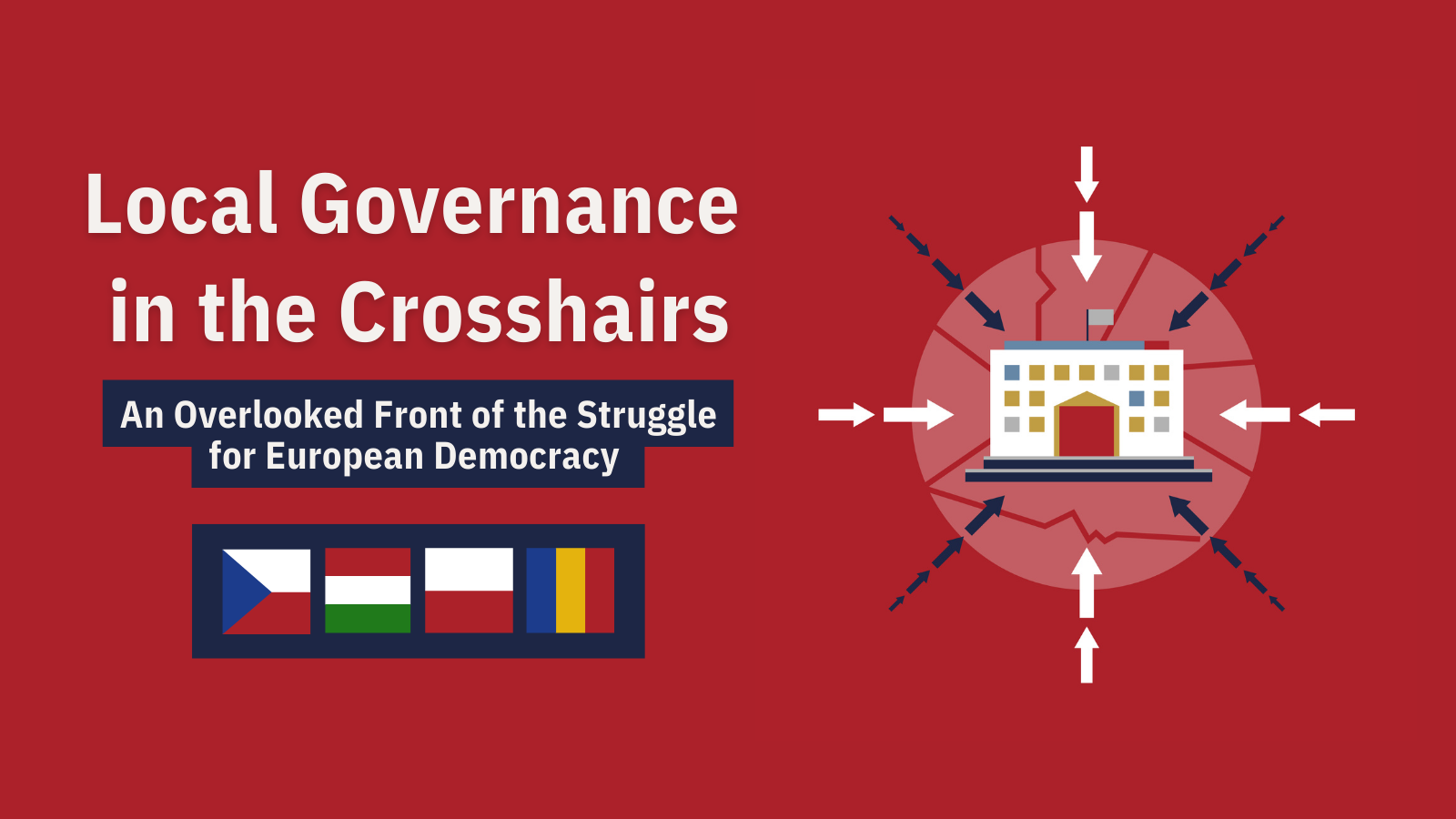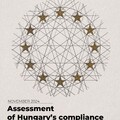In the landscape of democratic institutions and especially within the context of democratic backsliding in Hungary and Poland, local governance generally receives less attention than other elements of a democratic society, such as the judiciary or the media. The Covid-19 crisis presented new kinds of challenges for local governments both in terms of crisis management tasks and the quickly changing legal, political and financial framework in which they operate. Our new regional research report highlights how the more lasting effects of the pandemic have manifested through changing legislation, municipalities’ access to funding, transparency and accessibility of local decision-making - all of which point in the direction of shrinking space for manoeuvre, deliberation and civic engagement.

Executive Summary
Three years of cumulative crises. Three years ago in March 2020, the first cases of the Covid-19 virus were detected in East-Central European countries. The pandemic continued to claim tens of thousands of victims in the region over the following years. In wake of the health crisis, European economies first took a hit in 2020, then in 2021 inflation returned in force and continued to present a challenge through 2022 and into 2023. Following the Russian invasion of Ukraine in February 2022 East-Central European countries provided refuge for millions of Ukrainians, while also attempting to decouple from Russian energy supply and tackle increased energy prices going into the heating season of 2022/23.
Municipalities at the frontline. Local self-governance represents a fundamental cornerstone of democracy in the region. This study takes a look at how the crisis-laden years impacted local democracies in the Czech Republic, Hungary, Poland and Romania. The pandemic itself has presented new operational challenges for municipalities in how they organised the provision of health care, education and other public services.
In general, local governments proved adaptive and resilient, clearly prioritised the well-being of their citizens, and took care - often in cooperation with ad-hoc initiatives of civil society - of the elderly and vulnerable. In short, the general impression from desk research and case studies has been that the value of subsidiarity has really shown itself during Covid-19, as the decision-makers with the most direct contact to citizens have acted swiftly and in the best interest of the population. The experience of successful crisis-management has shed light on the importance of autonomous local governance, however it did not empower it in the administrative sense. In fact, the more lasting effects of the pandemic have manifested through changing legislation, municipalities’ access to funding, transparency and accessibility of local decision-making - all of which pointed in the direction of shrinking space for manoeuvre, deliberation and civic engagement.
The opportunism of national governments. The emergency situation paved the way for state interventions and actors in charge of the executive formulated measures in a way that also served their political interests. In all four countries analysed, national governments attempted to expand influence and control over local governments by centralising resources and/or competences. In Hungary, local autonomy had already been severely restricted prior to 2020, but the trend continued during the pandemic - under the state of emergency the government was allowed to rule by decree, prohibited the organisation of referenda and suspended sessions of city councils (not even allowing remote sittings). In Czechia and Romania city councils were recommended to only convene remotely (after abandoning a measure of mandatory restriction in Czechia), while in Poland municipalities acted sooner than the government and often transferred to online mode before any legislative change was enacted. In Romania, certain local law enforcement and health care competences were transferred to national level in response to the crisis. In Hungary and Poland, plans to centralise health care facilities were circulated, but not (yet) implemented. However, centralisation also affected policy areas seemingly unrelated to Covid in both countries: education in Poland and spatial planning in Hungary.
Crisis management introduced new burdens on municipal budgets through unexpected items of expenditure. Diminishing tax revenues due to reduced economic activity posed an additional threat to budget balances and central governments were expected to alleviate the financial pressure on municipalities. In Hungary, the opposite happened when the government introduced a tax break on local business tax, suspended other sources of municipal revenues, prohibited borrowing (which was already dependent on government approval) and tax increase for local governments and increased the solidarity tax of larger cities. To a lesser extent, local revenues were also adversely impacted in Poland by a reduction of personal income tax, transfer of environmental protection funds and for some municipalities, transfers from the equalisation scheme were reduced. Nonetheless, all four countries introduced some form of financial compensation for local governments, but also with special national attributes. In Czechia, the idea to distribute funds on a case-by-case basis was floated, challenged and quickly abandoned. Instead, each municipality received the same per capita amount of compensation.
Conversely, the other three countries employed funding schemes with obscure decision-making processes and non-transparent award criteria. Romania provided explicit Covid-related compensations through the Budget Reserve Fund, Poland introduced a government fund for local investments, while Hungary used both direct compensation and development funds to assist municipalities. All three approaches have been criticised for supporting partisan interests, but it was only blatantly obvious in Hungary, where funds received by opposition-led cities were incomparable to what government-affiliated municipalities received. In each case the distribution of funding was done in a way to shift the balance of power in favour of the national level and to increase the dependency of the local level. Similar patterns could be observed during the looming energy crisis, where governments prioritised discretionary funding decisions and the Hungarian government displayed clear partisanship towards municipalities. In fact, such funding decisions and the shifting of competences represent the most consistent and lasting impacts of the Covid-19 pandemic on local governance.
The level of decentralisation in public administration matters. When considering the factors which might influence how vulnerable or resilient local governments are to such centralisation attempts, we highlighted the original level of decentralisation in public administration (including competences and sources of revenues) and the recent concentration of political power. Along these two axes, the four countries could be characterised relative to each other. In Hungary, where political power is completely hegemonic, the government has a constitutional majority in Parliament and public administration has already been largely centralised prior to the pandemic, interactions between the central and local level happen in a command-and-control nexus and the local level cannot offer meaningful resistance. In Poland, the political hegemony is contested, and the local level still has the resources, popular support and constitutional protection necessary to at least challenge centralisation efforts to varying degrees of success. Czechia and Romania both have comparatively more fragmented governments, but the differences in the level of decentralisation between their public administration offers an insight into the differing experiences of their municipalities in times of crisis. In Czechia, local actors can build on secure institutional foundations and have enough political capital to maintain a competitive balance and protect the status quo. In contrast, Romanian municipalities lack such resources in a centralised state and rely on informal linkages and may pursue clientelistic bargaining strategies, which could yield localised results.
Democratic resilience under pressure. Local civil society and the participation of communities in local politics is fundamental for building democratic resilience. Despite the opportunities presented by municipal council sittings going online, the general experience was that the pandemic limited interactions between citizens and decision-makers. Municipalities embraced digitalisation with significant variation and even where the digital transition of public services was considered a success, public participation at best did not improve. Another sign of deteriorating democratic resilience was, when both in Hungary and Romania local decision-makers have been shown to abuse their emergency powers. In times of crisis, funding is also scarce for independent media and with local newspapers already either non-existent or serving as mouthpieces of local authorities, objective reporting on local issues becomes more and more difficult to come by, limiting an important channel of accountability.
EU funding at stake. These three years also saw intense negotiations related to EU funding. The EU’s 2021-27 budget was accepted and the novel Recovery and Resilience Facility was set up to address the economic fallout caused by the pandemic. European decision-makers used the increased leverage provided by the multiple crises to introduce new measures protecting tax-payer money. With the help of the conditionality mechanism and the less predetermined structure of the RRF negotiations, questions of democratic values and rule of law have been explicitly interlinked with the option to receive payments in Hungary and Poland. This puts local governments in precarious positions, as they would badly need the EU-funding for local investment projects. The delay or suspension of such payments risks further increasing their dependence on the respective governments, which only erodes local autonomy and the foundations of self-governance, as the past three years have shown us. These lessons should be integrated into the rule of law debates and the future of Cohesion Policy. Municipalities’ vulnerability to the partisan interests of national governments could be countered with more direct funding and substantive partnership.
Recommendations. With the realistic prospect of continued global crises affecting the region, it is timely to rediscover the value of subsidiarity. The crises of the past three years have shown that municipalities are worthy of support and empowerment, especially in countries with illiberal, autocratic tendencies. This means that local governments should be reinforced vis-à-vis national governments by strengthening the administrative, financial and constitutional safeguards of local autonomy. However, seeing that local governments also have their democratic deficits, it is equally important to empower local communities and civil society to engage with local authorities and continue to demand more transparency and accountability.
The study is edited and published by K-Monitor (Hungary) in partnership with Oživení (Czech Republic), Sieć Obywatelska Watchdog Polska (Poland) and Funky Citizens (Romania). The research project was supported by the National Endowment for Democracy. The views and opinions expressed in this report are those of the authors and do not necessarily reflect the official policy or position of the National Endowment of Democracy.
Címkék: english
Szólj hozzá!
A bejegyzés trackback címe:
Kommentek:
A hozzászólások a vonatkozó jogszabályok értelmében felhasználói tartalomnak minősülnek, értük a szolgáltatás technikai üzemeltetője semmilyen felelősséget nem vállal, azokat nem ellenőrzi. Kifogás esetén forduljon a blog szerkesztőjéhez. Részletek a Felhasználási feltételekben és az adatvédelmi tájékoztatóban.





